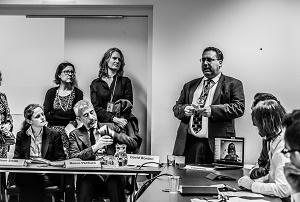Dear reformer,
30 years ago this month, I sent the first bulletin to our fledgling email list. Our network in the 1990s was the first movement-wide structure for drug policy reform efforts online. You can read about our early work, and some of the directions it's taken us, in the history section of our About page.

That makes organizations like ours more dependent on supporters like you. Will you make a donation to our work today – or sometime before the end of this year – to help us continue doing work in drug policy reform that others aren't?
Right now, some of the underfilled or otherwise unfilled roles we play in the movement are these:
- Analyzing how the continuing prohibition of cannabis (marijuana) puts workers in danger by increasing the use of cash for purchases, at a time when people are using less cash, and using our findings to help pass reforms like Safe Banking that Congress could pass now.
We're not the only group trying to pass Safe Banking. But no one had studied what actually happens during cannabis retail robberies before we did, and that allowed some members of Congress to deprioritize the bill. Our research and our advocacy have made it harder to claim that fully legal banking access for cannabusinesses isn't a true worker safety issue.
We're also more focused than most players in the issue on what may be needed beyond the SAFER Banking Act to reduce cash prevalence. Our first paper was about what happened in Washington State; our second will take a national and state-by-state look.
- Arguing the human rights case for justifying drug legalization (and particularly cannabis legalization) in the United Nations treaty system, despite problematic language for legalization in the drug treaties. Our assertion is that the global prohibitionist drug control systems inevitably leads to very serious human rights violations. But it's human rights that takes precedence over other issues, according to the UN Charter. So does the core purpose that the drug treaties state – but which they don't achieve very well – which is the well-being of humankind.
Our work at the UN has advanced this position in civil society, supported governments making similar arguments, and brought directly related issues to the attention of major media. We are returning to this thread of our work in 2024.
- We are taking a "Modernizing Global Drug Policy" agenda to Congress, seeking to embed more of the key human rights, health and development concerns in drug policy into US foreign policy and diplomacy. Changes to the drug treaties are part of that, but there's a lot more. I can't share our legislative proposal publicly yet, but the issues you'll find on documents linked from our UN page suggest a lot of it.
- We are championing advocacy for using international Rule of Law mechanisms, like the International Criminal Court and Magnitsky targeted sanctions against rights-abusing officials, to address serious human rights violations in the drug war around the world. We do this through a series of events we've held since 2017 at the Commission on Narcotic Drugs and other UN and international meetings, working with coalitions that support those kinds of programs, lobbying with allies on Capitol Hill, and even the occasional protest.
Much of our work in this area has dealt with the drug war in the Philippines, in which the former president instigated what's believed to have been more than 30,000 extrajudicial killings, and which has continued under the new president. But we also played a role encouraging allies to undertake a successful effort seeking US Magnitsky sanctions for killings in the Bangladesh drug war. Some of our work in this area has been very high profile, and plans are in the works right now for 2024.
- We continue to publish the Drug War Chronicle newsletter. While reporting on drug policy is more extensive than it was 30 years ago, Drug War Chronicle is still the only daily source bringing all the key news on the full range of drug reform issues together in one place, and plays an important role for the most interested advocates and observers.
Your support will let us continue to play roles in the movement that are unfilled or underfilled, and make a needed difference both in cannabis policy reform and in efforts to end the larger war on drugs. If you donate to our educational 501(c)(3) nonprofit (link from our main donation form) before the end of the year, and if you're a US taxpayer, you can get a deduction on your taxes for 2023. Non-deductible donations to our 501(c)(4) nonprofit are also needed, for our lobbying work and for a share of our publishing costs.
Our donation forms let you make a one-time donation, or you can sign up to make your donation recurring, and it takes credit cards, PayPal or ACH. The donations section on our About page has info for how to donate by mail or give stocks instead.
Thank you for your new or continued support after these 30 years, and to those of you who have donated before.
Sincerely,

David Borden, Executive Director
StoptheDrugWar.org
P.O. Box 9853, Washington, DC 20016
https://stopthedrugwar.org
This work by StoptheDrugWar.org is licensed under Creative Commons Attribution-ShareAlike 4.0 International
Add new comment